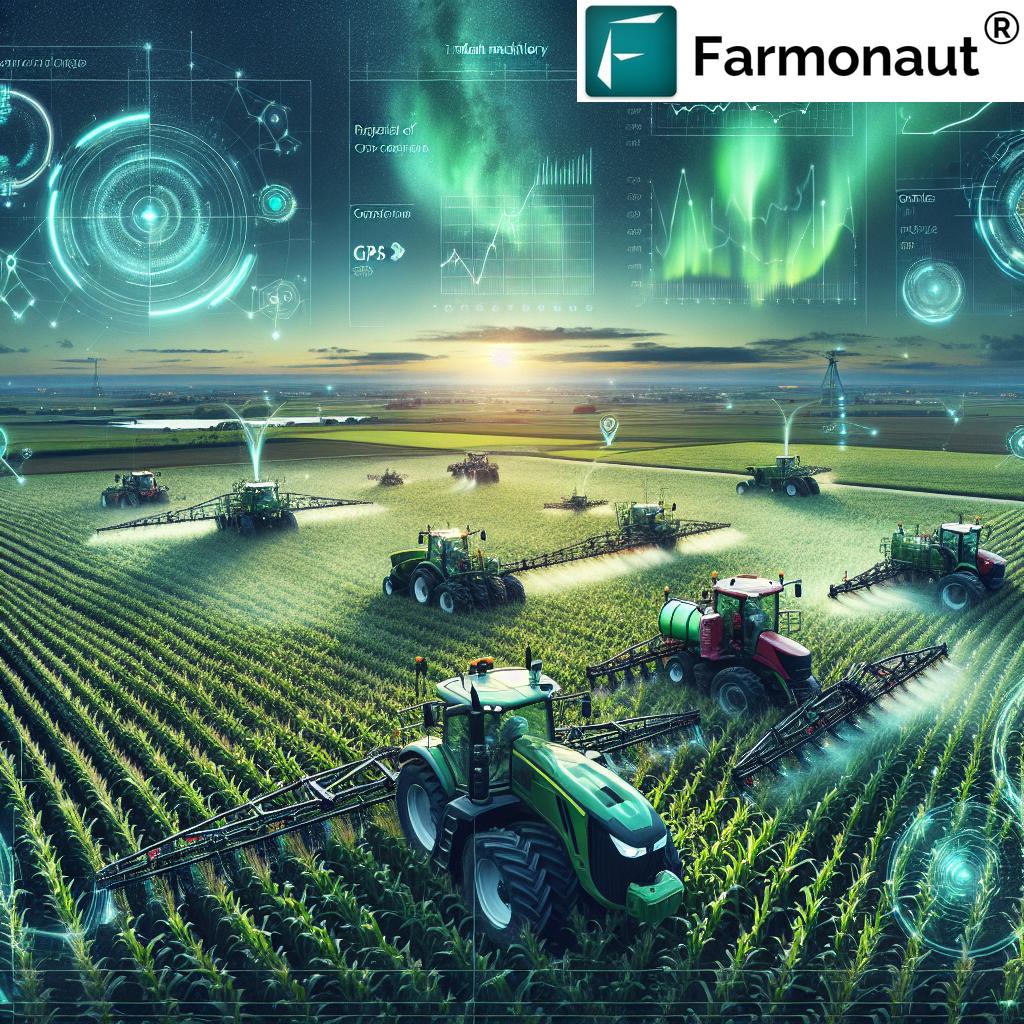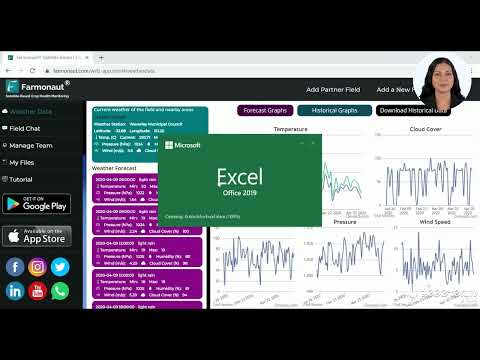Solar Storms and GPS Disruption: How Farmonaut’s Precision Agriculture Technology Safeguards Canadian Farmers
“Solar storms can disrupt GPS services, affecting up to 95% of precision agriculture operations in Canada and the USA.”
In the ever-evolving landscape of modern agriculture, Canadian farmers face a unique challenge that combines the forces of nature with cutting-edge technology. Solar storms, powerful bursts of energy from our sun, have recently emerged as a significant threat to the precision agriculture systems that many farmers rely on for their day-to-day operations. As we delve into this critical issue, we’ll explore how these celestial events impact GPS-guided farming equipment and how innovative solutions, like those offered by Farmonaut, are helping to safeguard the future of farming in Canada and beyond.
Understanding the Impact of Solar Storms on GPS in Agriculture
Solar storms, also known as solar flares or coronal mass ejections, are intense bursts of radiation from the sun that can interfere with Earth’s magnetic field. While these events have always occurred, their impact on modern agriculture has become increasingly pronounced as farming practices have become more reliant on GPS technology.
- GPS disruption affects crucial farming operations such as planting, spraying, and harvesting
- Precision agriculture technology relies heavily on accurate GPS signals for guidance and data collection
- Solar storms can cause errors in GPS positioning, leading to inefficiencies and potential crop damage
The reliance on GPS in agriculture has grown exponentially over the past two decades. From GPS-guided tractors to precision planting systems, these technologies have revolutionized farming practices, improving efficiency and yield. However, this dependence also creates vulnerability when GPS signals are compromised by solar activity.

The Vulnerability of Precision Agriculture to Solar Flares
Precision agriculture has become a cornerstone of modern farming, allowing for targeted application of resources and optimized crop management. However, the very precision that makes these systems so valuable also makes them susceptible to disruptions in GPS signals.
“During solar flares, farmers may experience operational delays of up to 4 hours per day when using GPS-guided tractors.”
- Premium GPS signals used in agricultural machinery are particularly vulnerable to solar interference
- Even minor disruptions can lead to misalignment in planting rows or uneven distribution of fertilizers and pesticides
- The financial impact of these disruptions can be significant, especially during critical planting or harvesting periods
As we navigate these challenges, it’s crucial to explore solutions that can help farmers maintain productivity even in the face of GPS disruptions. This is where innovative companies like Farmonaut come into play, offering alternative technologies that complement and, in some cases, replace traditional GPS-dependent systems.
Farmonaut’s Approach to GPS-Independent Precision Agriculture
Farmonaut is at the forefront of developing solutions that address the vulnerabilities of GPS-dependent farming systems. By leveraging a combination of satellite imagery, artificial intelligence, and advanced data analytics, Farmonaut provides farmers with robust tools that remain functional even during solar storm events.
Access Farmonaut’s innovative solutions:
Key features of Farmonaut’s technology include:
- Satellite-based crop health monitoring that doesn’t rely on GPS for positioning
- AI-powered field mapping and crop analysis
- Real-time weather data integration for informed decision-making
- Blockchain-based traceability solutions for supply chain management
These technologies provide a robust alternative to GPS-dependent systems, ensuring that Canadian farmers can continue to operate efficiently even when solar storms disrupt traditional precision agriculture tools.
Comparative Analysis: GPS-Dependent vs. GPS-Independent Farming Solutions
To better understand the advantages of Farmonaut’s approach, let’s compare GPS-dependent farming methods with GPS-independent solutions during solar storm events:
| Farming Operation | GPS-Dependent Method Impact | Farmonaut’s Solution | Efficiency During Solar Storms | Cost Implications |
|---|---|---|---|---|
| Planting | Severe Disruption | AI-Powered Field Mapping | GPS: 30% vs. Farmonaut: 90% | GPS: Potential yield loss Farmonaut: Maintained productivity |
| Spraying | Moderate Delay | Satellite Imagery Analysis | GPS: 50% vs. Farmonaut: 85% | GPS: Increased input costs Farmonaut: Optimized resource use |
| Harvesting | Minor Disruption | Real-time Crop Health Monitoring | GPS: 70% vs. Farmonaut: 95% | GPS: Possible quality reduction Farmonaut: Timely harvest ensured |
| Soil Sampling | Significant Delay | Multi-spectral Data Analysis | GPS: 40% vs. Farmonaut: 80% | GPS: Delayed decision-making Farmonaut: Proactive soil management |
| Irrigation Management | Moderate Impact | Satellite-based Moisture Mapping | GPS: 60% vs. Farmonaut: 90% | GPS: Water waste risk Farmonaut: Efficient water use |
This comparison clearly illustrates the resilience of Farmonaut’s GPS-independent solutions in the face of solar storm disruptions. By maintaining high efficiency across various farming operations, Farmonaut’s technology helps Canadian farmers minimize losses and maintain productivity even under challenging conditions.
The Role of Satellite Imagery in Modern Farming
At the heart of Farmonaut’s innovative approach is the use of satellite imagery for precision agriculture. This technology offers several advantages over traditional GPS-guided systems, particularly in terms of resilience to solar storm interference.
- Satellite imagery provides a broad, comprehensive view of farmland
- Multi-spectral analysis allows for detailed crop health assessment
- Data can be collected and analyzed regardless of GPS signal availability
By leveraging satellite technology, Farmonaut enables farmers to make informed decisions about their crops without relying solely on GPS-guided equipment. This approach not only safeguards against solar storm disruptions but also provides additional insights that can improve overall farm management.
Integrating Weather Data for Informed Decision-Making
Another crucial aspect of Farmonaut’s technology is its integration of real-time weather data. This feature is particularly valuable during periods of solar activity, as it allows farmers to anticipate potential GPS disruptions and plan accordingly.
Explore Farmonaut’s weather data capabilities: Farmonaut API
- Real-time weather forecasts help farmers plan operations around potential GPS disruptions
- Historical weather data analysis aids in long-term crop planning
- Integration of weather information with crop health data provides comprehensive insights
By combining weather data with satellite imagery and AI-powered analytics, Farmonaut offers a holistic approach to farm management that remains robust even when traditional GPS systems are compromised.
The Future of Farming: Adapting to Technological Challenges
As we look to the future of agriculture in Canada and beyond, it’s clear that adaptability will be key. The challenges posed by solar storms to GPS-dependent farming systems highlight the need for diverse, resilient technologies in modern agriculture.

- Continued development of GPS-independent precision agriculture technologies
- Integration of multiple data sources for comprehensive farm management
- Increased focus on resilience and adaptability in agricultural technology
Companies like Farmonaut are leading the way in developing these next-generation farming solutions, ensuring that Canadian farmers can continue to thrive in an increasingly complex technological landscape.
Empowering Canadian Farmers with Farmonaut’s Technology
As we’ve explored throughout this article, the challenges posed by solar storms to GPS-dependent farming systems are significant. However, with innovative solutions like those offered by Farmonaut, Canadian farmers have powerful tools at their disposal to navigate these challenges and maintain productive, efficient operations.
Discover Farmonaut’s comprehensive solutions: API Developer Docs
- Satellite-based crop monitoring provides GPS-independent insights
- AI-powered analytics offer deep understanding of farm conditions
- Real-time weather data integration supports informed decision-making
- Blockchain-based traceability enhances supply chain management
By embracing these technologies, Canadian farmers can not only mitigate the risks posed by solar storms but also position themselves at the forefront of agricultural innovation.
Conclusion: Embracing Resilience in Modern Agriculture
The impact of solar storms on GPS-dependent farming systems serves as a powerful reminder of the need for resilience and adaptability in modern agriculture. As we’ve seen, innovative technologies like those developed by Farmonaut offer a path forward, providing Canadian farmers with robust, GPS-independent solutions that can withstand the challenges posed by solar activity.
By embracing these advanced technologies, farmers can ensure the continued productivity and efficiency of their operations, even in the face of unpredictable natural phenomena. As we move forward, the integration of satellite imagery, AI-powered analytics, and real-time weather data will play an increasingly crucial role in shaping the future of farming in Canada and around the world.
The journey towards a more resilient and technologically advanced agricultural sector is ongoing, and companies like Farmonaut are at the forefront of this evolution. By providing farmers with the tools they need to navigate the complexities of modern farming, we’re helping to secure a sustainable and productive future for agriculture in Canada and beyond.
FAQs
- How do solar storms affect GPS signals used in agriculture?
Solar storms can interfere with GPS signals, causing inaccuracies in positioning and potentially disrupting precision agriculture operations like planting and spraying. - What are the main advantages of Farmonaut’s technology over traditional GPS-dependent systems?
Farmonaut’s technology uses satellite imagery and AI analytics, which are not dependent on GPS signals, making it more resilient to solar storm disruptions. - Can Farmonaut’s solutions completely replace GPS-guided equipment in farming?
While Farmonaut’s solutions provide valuable alternatives, they are designed to complement existing systems rather than completely replace GPS-guided equipment. - How does satellite imagery help in precision agriculture?
Satellite imagery provides comprehensive views of farmland, allowing for detailed crop health assessment and informed decision-making without relying on GPS. - Are Farmonaut’s solutions suitable for small-scale farmers in Canada?
Yes, Farmonaut offers scalable solutions that can benefit farmers of all sizes, from small-scale operations to large agricultural enterprises.






